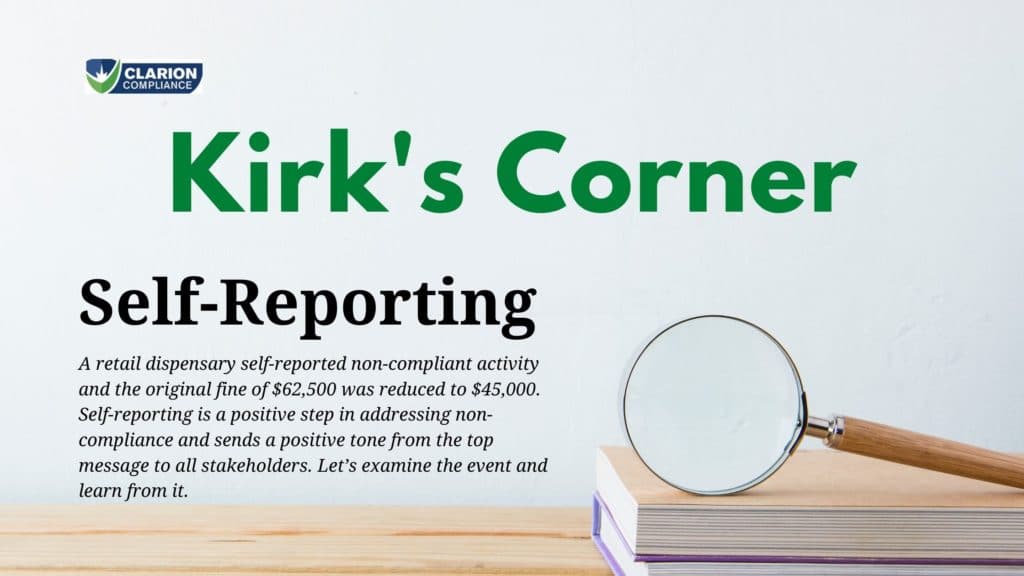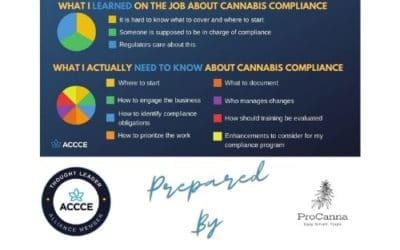
General Fact Pattern
A cannabis retail establishment in the state of Nevada recently self-reported to the cannabis regulatory authorities that they had sold a customer more than the legally allowed ounce of flower product over a given period. It is reported that the retail business discovered that the built-in safeguards that monitored their sales to individuals had been disabled. Originally, the regulatory body had fined the company $62,500 for the event and later reduced that amount to $45,000. In mitigation, the state determined that a lower fine was in order because the license holder self-reported the incident.
Across the United States, we are seeing steep fines for non-compliant conduct from the licensed cannabis business. If you are going to operate in a high-risk fashion, you should consider setting money aside each calendar year for fines from your local and state regulatory agencies, but a far better approach is to invest in your risk management program. Work to identify risk areas and develop control activities and standard operating procedures to address issues before they become a non-compliant event. A risk-based approach and follow-up will save you money, mature your organization, and help protect your business from untoward fines. Whether you are starting your risk program or maturing it, the steps mentioned below may assist you in your endeavors.
Read more: Risk Management Makes Your Business More Valuable – ACCCE
Steps You Can Take
Here are a few activities you can undertake if you find yourself in this type of situation:
- Develop a policy that clearly states that no one is authorized to disable the customer monitoring tool in the point-of-sale system
- Add to the SOP that the manager or senior person who opens the retail store each day is to personally check the sales program to ensure that the safeguard is on
- Add to the SOP that whenever anyone discovers that the safeguard is disabled, they immediately report that condition to the compliance officer through the whistle blowing program
- Train all sales personnel to ensure this feature is “on” before they register a sale if there is an icon that is readily visible
- Train all managers regarding the SOP’s and senior management to ensure the SOP’s are carried out on a daily basis
- If the safeguard is ever found to be disabled, the compliance officer should document that condition and undertake an internal investigation to determine the cause
Summary
Within the cannabis risk management framework, the above steps reflect a risk management program with an effective compliance and ethics / whistleblower program. Consider the process of compliance management where the compliance officer should develop and maintain sound compliance management and integrate it into product and service design, delivery, and administration. Compliance should be integrated into a stakeholder’s day to day responsibilities.
Don’t have a risk program? We have you covered with the ACCCE Risk Program Template, Risk Program Package – ACCCE.
Also consider a strong ethics and whistleblower program to promote reports of noncompliance. These policies and procedures help to improve the commercial cannabis business’s compliance and minimize the risk of penalties, fines, and damages. An ethics and whistleblower program should be communicated as a positive program important to the overall health of the business. This establishment made the right call by self-reporting their issue. Their transparency to their regulatory body reflects their integrity and amplifies their commitment to compliance to all stakeholders. It also saved them about $18,000.
The Association of Certified Commercial Cannabis Experts (ACCCE) is dedicated to advancing the professional knowledge and skills of those committed to commercial cannabis risk management.
Click here for more information on how ACCCE can help our members at commercial cannabis businesses.



